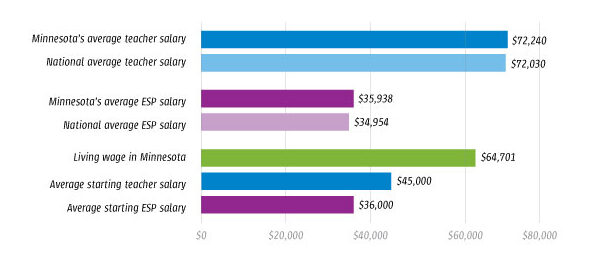NEA report finds inflation outpacing educator pay increases Minnesota ranks 15th in teacher pay, 16th in ESP pay, but nationally teachers make 5% less than they did ten years ago.

NEA’s annual Educator Pay in America report, released in April, tracks the state of teacher and education support professional pay at the state and national level. The report shows Minnesota’s average teacher salaries for the 2023-24 school year were $72,420 and K-12 ESP salaries were $35,938.
While we rank towards the top compared to other states—15th and 16th in the nation, respectively— educator wages have not kept up with inflation. On average, teachers across the country earn 5% less than they did ten years ago.
Furthermore, both starting teacher salaries in Minnesota and average ESP salaries are not high enough to provide a living wage. According to the report, a living wage in Minnesota is $64,701, but starting teacher salaries average around
$45,000 and K-12 ESP wages average about $36,000.
In addition to inflation, other costs are also increasingly pricing educators out of the classroom: skyrocketing health insurance and childcare costs, lack of affordable housing and uncertainty regarding student loans. John Wolhaupter, president of Anoka Hennepin Education Minnesota, spoke with Minnesota Public Radio in June about how Anoka Hennepin is struggling to keep early career educators because they can’t afford to live in or near the district.
“It’s really a struggle to bring in new teachers on a continuing basis… especially when you’re competing with other professions that people can go into right out of college and make $10,000 or $20,000 more,” Wolhaupter told MPR.
The union difference
The report also showed how strong unions positively impact educator pay. In states with collective bargaining, teachers make 24% more and ESPs make 7% more than in states without any collective bargaining laws.
Education Minnesota’s members have led the charge on increasing pay for both classroom teachers and ESPs. Our legislative agenda calls for a starting wage of $60,000 and raises across the board commensurate with experience and pay in similar professions, along with a $25/hour wage for hourly workers and a minimum hourly salary. This legislative session, we successfully protected unemployment insurance for ESPs over the summer and are currently working on establishing a statewide mandatory pool to help reduce health care costs for educators and ensure that more of their paycheck goes into their pockets.
Minnesota still has a long way to go to improve educator pay— especially for ESPs—but through our strong collective bargaining policies and the collective power of our members, we will be able to continue improvements on pay, pensions and health care.

